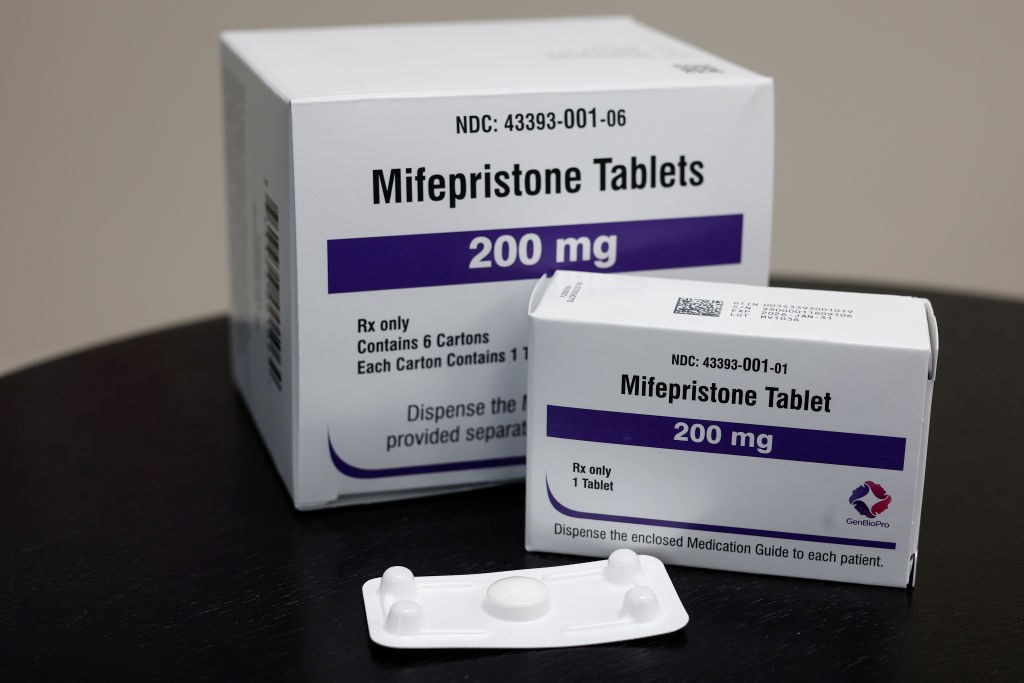Clinicians are providing medication abortion through telehealth services even to people in states where abortion is banned, thanks in part to shield laws in states where abortion is still legal. (Natalie Behring/Getty Images)
In state legislatures around the country, medication abortion has emerged as the central focus of the fight over abortion rights. As Democratic lawmakers in blue states enact shield laws to protect abortion medication prescribers, their Republican counterparts — particularly in states that have banned abortion — are filing a flurry of bills to restrict access.
Medication abortion accounted for nearly two-thirds of all clinician-provided abortions in states without total abortion bans in 2023, the most recent data available from the Guttmacher Institute, a research and policy organization focused on advancing reproductive rights.
Using medication to end a pregnancy requires taking two medications in succession: mifepristone to stop the pregnancy and misoprostol to induce contractions in the uterus to expel pregnancy tissue. These medications are also used by medical providers for other conditions, including to manage miscarriage and treat postpartum hemorrhage.
Research has shown medication abortion is effective and safe, with complications requiring hospitalization occurring in less than 0.3% of patients. Research also has shown medication abortion provided via telehealth is effective and safe, and comparable to in-person medication abortion.
Read on for an update on GOP-led state efforts to restrict access to abortion medication:
Reclassifying abortion pills as controlled substances
Last year, Louisiana — which has banned abortion — became the first state to pass a law reclassifying mifepristone and misoprostol as Schedule IV controlled substances, in the same class as drugs such as Xanax and Valium. Hospitals in the state have had to change how the drugs are stored, locking them in passcode protected containers outside of delivery rooms. Physicians in the state have said the new restrictions have interfered with or negatively impacted their treatment of patients.
Republican lawmakers in Kentucky, Missouri and Texas introduced similar legislation in their most recent legislative sessions, though all three bills died in committee.
More states are expected to follow Louisiana’s lead in the coming legislative session.
Banning and restricting telehealth abortions
While most abortions occur in person, telehealth is a growing provider. By the end of last year, 1 in 4 abortions was provided via telehealth, according to #WeCount, a national reporting effort by the Society of Family Planning, an abortion research organization.
About half of those were from providers practicing in states with shield laws who mailed abortion pills to people in states with telehealth restrictions, six-week abortion bans or total abortion bans.
Nine states currently have laws that explicitly ban telehealth-provided medication abortion, or ban the mailing of medication abortion drugs, according to KFF, a research and policy organization. Those are Arizona, Arkansas, Florida, Indiana, Kentucky, Oklahoma, South Carolina, Texas and West Virginia.
Eight Democratic-led states have shield laws designed to protect providers who offer medication abortion via telehealth to patients across state lines: California, Colorado, Maine, Massachusetts, New York, Rhode Island, Vermont and Washington.
But GOP-led states are fighting back.
Lawmakers in at least 14 states have introduced bills to criminalize the purchase, prescription and distribution of medication abortion, according to Jennifer Driver, who tracks reproductive state policy for the State Innovation Exchange, an organization focused on passing progressive state legislation.
In July, 15 Republican attorneys general signed a letter urging Congress to ban such shield laws because, they said, the laws interfere with states’ ability to enforce their own criminal laws.
Allowing citizen lawsuits
This month, the Texas Legislature passed a first-of-its-kind bill that would allow Texans to sue physicians, manufacturers and others from outside the state who mail abortion medication into the state. It also bans the manufacturing of abortion drugs in Texas. It’s now headed to Republican Gov. Greg Abbott, who is expected to sign it.
The law is expected to set up a legal fight over whether one state’s laws can be enforced in another state.
Meanwhile, a Louisiana law passed in June and dubbed the “Justice for Victims of Abortion Drug Dealers Act,” allows the mother of a fetus to sue out-of-state doctors and activists for performing or facilitating a medication abortion, and extends the window for such lawsuits from three years to five years.
Stateline reporter Anna Claire Vollers can be reached at avollers@stateline.org.

